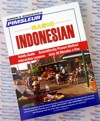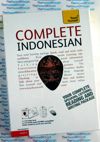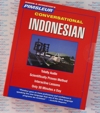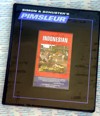Indonesian - Berlitz Phrasebook and Dicitonary
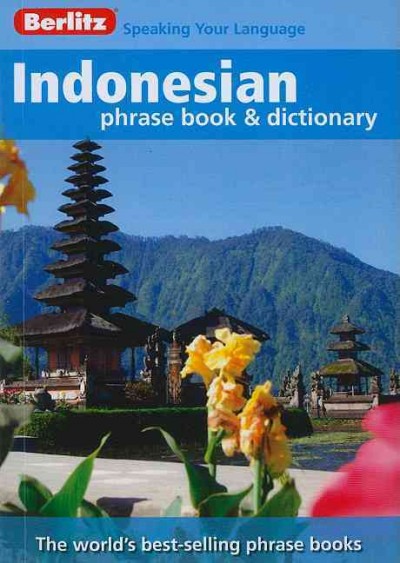
Indonesian - Berlitz Phrasebook and Dicitonaryover 8000 words and phrases |
 |
Indonesian - Berlitz Phrasebook and Dicitonary - PaperbackPaperback - 224pp You will never be lost for words with Berlitz - from arriving at the airport, to ordering food and drinks, sightseeing or booking accommodation; this portable Indonesian phrase book and dictionary covers everything you need to know to enjoy your trip. Featuring over 8,000 of the most useful everyday phrases, you will be able to converse with confidence in any situation that you may come across; whether you are travelling with children, on business, or you have a disability. You can forget spending hours of valuable time rifling hopelessly through pages of dull, small print, because the easy-to-use, colour-coded sections in this book allow you to flick straight to the phrase you need; leaving you more time to enjoy yourself. Language is up-to-date and accompanied by clear pronunciations, so you can start using this book straight away, regardless of ability. Full-colour photographs and illustrations help to visually clarify many important subjects, such as currency and motoring signs. Also included is a comprehensive bilingual dictionary and quick reference table for the most essential phrases. With language as no barrier you can
About the Indonesian LanguageIndonesian (Bahasa Indonesia) is the official language of Indonesia. Indonesian is a standardized dialect of the Malay language that was officially defined with the declaration of Indonesia's independence in 1945 although in the 1928 Indonesian Youth Pledge have declared it as the official language. Indonesia is the fourth most populous nation in the world. Of its large population the number of people who fluently speak Indonesian is fast approaching 100%, thus making Indonesian one of the most widely spoken languages in the world.Most Indonesians, aside from speaking the national language, are often fluent in another regional language or local dialect (examples include Minangkabau, Sundanese and Javanese) which are commonly used at home and within the local community. Most formal education, as well as nearly all national media and other forms of communication, are conducted in Indonesian. In East Timor, which was an Indonesian province from 1975 to 1999, the Indonesian language is recognised by the constitution as one of the two working languages (the other is English, alongside the official languages of Tetum and Portuguese). The Indonesian name for the language is Bahasa Indonesia (lit. "the language of Indonesia"). In the same way that English speakers would refer to the official language of France as "French" (not Français), the most accurate way of referring to Indonesia's national language in English is "Indonesian". However, the foreign term Bahasa Indonesia can sometimes still be found in written or spoken English. In addition, the language is sometimes referred to as "Bahasa" by English-speakers, though this simply means "language" and thus is also not an official term for the Indonesian language. Linguistics To a certain degree, Indonesian can be regarded as an open language. Over the years, foreign languages such as Sanskrit, Chinese, Arabic, Portuguese, Dutch and English have enriched and expanded the Indonesian language, mostly through trade contacts and international media. Because of its semi-open status, there are those who regard Indonesian (as well as other forms of Malay) as lacking sufficient vocabularly and specialist terminologies. Yet some linguists consider this view to be a misconception, as a vast majority of foreign adopted words do have native equivalents. For example, the word asimilasi (from the Dutch word assimilatie) can also be expressed in Indonesian as penggabungan. Many words describing more modern inventions, objects or ideas are often Indonesianised adoptions of foreign words (e.g. computer becomes komputer), although many of these words also have Indonesian equivalents. For example, a "cell/mobile phone" can be referred to in Indonesian as either pon-sel/ telepon seluler (lit. cellular-telephone), HP (pronounced hah-péh - the acronymic form of hand phone) or telepon genggam (lit. "hold-in-the-hand telephone"). Other words such as "rice cooker" may be referred to simply as "rice cooker" or, again, in a more native Indonesian/ Malay form, i.e. penanak nasi (a word formed from the verb menanak, meaning 'to cook rice by boiling' + nasi, meaning 'cooked rice'). Overall, the use of native and non-native words in Indonesian is equally common and reflects the country's efforts towards modernization and globalization. Many aspects of Indonesian grammar are relatively simple in the initial stages of study, making it one of the easiest languages to learn for adults. Indonesian does not require conjugation of verb tenses or participles, plural forms, articles and gender distinction for the third person pronouns. It is important to note that neither do many other languages traditionally regarded as 'complex', including Chinese (see Chinese grammar) and Thai for example. In spite of this, Indonesian and Malay are generally regarded as easy languages to learn, mostly because they are not tonal languages and they no longer use complex characters within their writing system, but rather utilize the Latin alphabet. Similar cases can also be seen in other Southeast Asian languages such as Vietnamese and Tagalog. However, Indonesian does possess a complex system of affixations. The absence of tenses in the language is substituted through the use of aspect particles and (as with any language) Indonesian grammar often presents an array of exceptions. Also, the simplicity of Indonesian grammar at a beginners or basic level has the disadvantage of misleading many learners of the language into thinking that more advanced Indonesian grammar is just as simple. |
Indonesian - Berlitz Phrasebook and Dicitonary - Paperback |

 0 Items (Empty)
0 Items (Empty)
